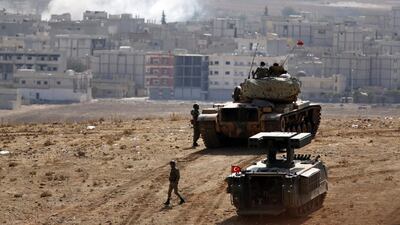ISTANBUL // The political head of the Kurdish group fighting ISIL in Kobani has accused Turkey of failing to fulfil a pledge to deliver aid to the embattled Syrian town.
Salih Muslim, leader of the Democratic Union Party (PYD), said that Ankara could save the town from the ISIL onslaught if it allowed military and humanitarian assistance to reach it from other Kurdish areas.
"All we're asking is for them to open the way to allow us to help our own people. That would be enough and more than enough to save Kobani," he told The National on Thursday.
Ankara has only delivered a single lorry of medical aid to the besieged town despite Turkish officials having assured him of more assistance in talks earlier this month, Mr Muslim said.
“They promised us all kinds of help. This is not what we were expecting.”
Officials in Ankara did not respond to requests for comment, however local officials at the border confirmed to the AFP news agency on Thursday that they had begun detaining and fingerprinting anyone crossing, on suspicion they were fighters.
Turkey has accepted an influx of 200,000 refugees from Kobani, but has so far refused to allow the Kurds to reinforce the town or provide broader military support against ISIL.
Ankara’s decision rests on fears of becoming further embroiled in Syria’s civil war, its hostility to the PYD, which has close links with Turkish Kurdish rebels, and a desire to push its Western allies into toppling the regime of Bashar Al Assad.
“The Assad regime is the cause of instability in the region and has created the environment for radical terrorist groups,” Turkish foreign minister Mevlut Cavusoglu said on Thursday.
Turkey would play its part in the coalition against ISIL, he said, but only if its allies signed up to a broader strategy to address the chaos in Syria.
“It’s not realistic to expect that Turkey will lead a ground operation on its own.”
In the past two days, however, the price of Ankara’s inaction in Kobani has risen steeply.
Turkey is witnessing its deadliest riots in more than a decade, as Kurds have risen up in fury at what they see as their government’s complicity in the town’s fate.
Twenty-three people died in protests across the Kurdish-populated south-east this week and the unrest still simmered on Thursday.
Most of the deaths occurred when protesters clashed with Islamist groups and Turkish nationalists.
The government issued curfew orders, and troops and armoured personnel carriers rolled onto the streets of Kurdish-majority cities in scenes reminiscent of the 1990s, when the separatist PKK fought an insurgency against the Turkish state.
The violence, and the likely fall of Kobani to ISIL, could also derail an 18-month-old peace process between Ankara and the PKK.
By saving Kobani, however, Ankara risks empowering an organisation closely linked to the PKK, and also provoking retaliation from ISIL, which already controls about 200-kilometres of Turkey’s 900-kilometre border with Syria and is believed to have a substantial network within the county.
“[The government is] basically frozen in fear, because any solution they can come up with creates a whole array of other problems for them,” said Steven Cook, a Washington-based Turkey expert at the Council on Foreign Relations.
“The more they dither, the more they are going to find themselves confronting bigger security challenges.”
Turkey’s ruling Justice and Development Party (AKP) may view the prospect of a de-facto Kurdish mini-state on its Syrian border as more threatening to its long-term security than ISIL.
Some of the party’s support base may even sympathise with the movement. In a survey by Turkish polling firm Metropoll conducted in mid-September, 25 per cent of AKP respondents said that Turkey should not cooperate with regional and world powers against ISIL.
“The threat perception of the AKP leadership is not the same as many Turks,” said Suat Kiniklioglu, executive director of STRATIM, an Ankara-based foreign policy think tank.
In a tweet since deleted, AKP MP Emrullah Isler wrote on Wednesday that killings by Kurdish pro-PKK protesters were worse than those by ISIL, since the group ‘kills but doesn’t torture,’ an assertion contradicted by numerous testimonies from former ISIL prisoners.
“Turkey does not want a repeat scenario as it happened in Iraq,” Mr Kiniklioglu added, referring to the broad autonomy won by that country’s Kurdish region after the 1991 Gulf War.
“It is trying to squeeze the Kurdish leadership in Syria to agree to fight Assad and not form an autonomous entity there,” he added.
Equally, Ankara has understandable concerns about taking any action as part of a coalition it fears has only limited commitment to Syria’s future.
“There’s a view in Ankara that the allies are not there for the long run, but that Turkey will always have Syria on its border,” says Wolfgango Piccoli, a London-based Turkey expert at global risk advisory firm Teneo.
“They’ve seen this movie before — most notably in Iraq.”
On Thursday however, despite intensified allied airstrikes on ISIL positions around Kobani, the ISIL militants had wrested control of a third of the town, according to monitoring group the Syrian Observatory on Human Rights.
With its fall now seeming likely, Ankara may have limited time to wring concessions from its allies.
Many observers fear that even if it now changes course and assists the town, it may be too late to regain the trust of its 15 million strong Kurdish minority, many of whom view the town as an extension of their own homeland.
“Now it’s too late,” said Mr Piccoli. “Even if there’s a shift in policy it will be difficult to regain the trust of the Kurds and make sure that the peace process continues.”
foreign.desk@thenational.ae

